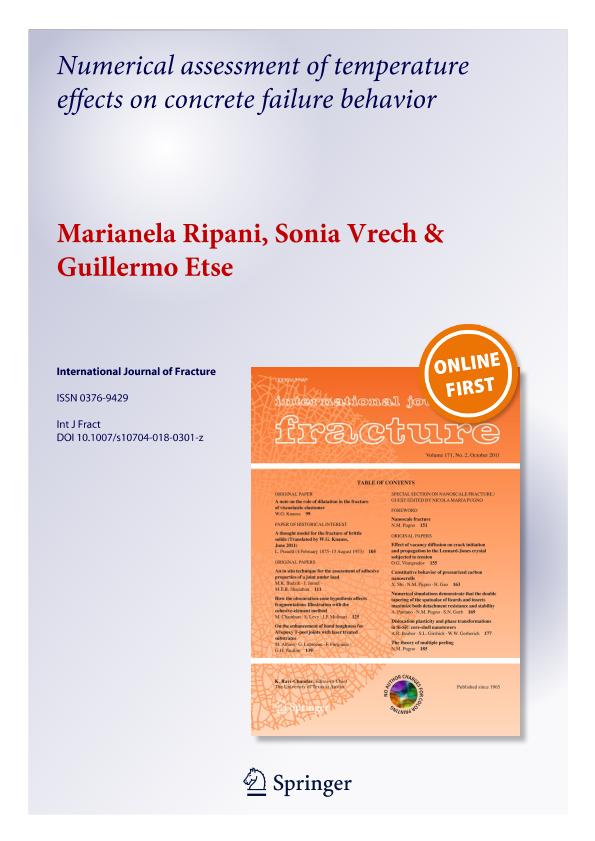Mostrar el registro sencillo del ítem
dc.contributor.author
Ripani, Marianela

dc.contributor.author
Vrech, Sonia Mariel

dc.contributor.author
Etse, Jose Guillermo

dc.date.available
2021-09-27T12:25:09Z
dc.date.issued
2018-08
dc.identifier.citation
Ripani, Marianela; Vrech, Sonia Mariel; Etse, Jose Guillermo; Numerical assessment of temperature effects on concrete failure behavior; Springer; International Journal Of Fracture; 212; 2; 8-2018; 1-18
dc.identifier.issn
0376-9429
dc.identifier.uri
http://hdl.handle.net/11336/141539
dc.description.abstract
This work focuses on the evaluation of temperature effects on concrete failure behavior and modes by means of a realistic thermodynamically consistent non-local poroplastic constitutive model, previously developed by the authors, which is modified in this work. In this regard, two original contributions are presented and discussed. Firstly, and based on significant published experimental results related to this very complex aspect such as the effects of temperature in concrete failure, a temperature dependent non-associated flow rule is introduced to the poroplastic constitutive model to more accurately account for the temperature dependent inelastic volumetric behavior of concrete in post-peak regime. This is crucial for improving overall model accuracy, particularly regarding the temperature effects on concrete released energy during degradation processes. Secondly, and more importantly, the explicit solution of the localization condition in terms of the critical hardening modulus is developed regarding the non-local poroplastic constitutive model reformulated in this work, which allows the analysis of localized failure modes in the form of discontinuous bifurcation of quasi-brittle porous materials like concrete under different temperature, hydraulic and stress state scenarios. Also numerical procedures are followed, which also allow the evaluation of temperature effects on the critical directions for localized failure or cracking which is performed in this work for a wide spectrum of stress states and temperatures. Both, undrained and drained hydraulic conditions are evaluated. The results in this work demonstrate the soundness of the proposed constitutive model modifications and of the derived explicit solution for the critical hardening modulus to accurately predict the temperature effects on both, concrete volumetric behavior, and on the failure modes and related critical cracking direction. They also demonstrate that concrete failure mode and critical localization directions are highly sensitive to temperature, particularly in the compressive regime.
dc.format
application/pdf
dc.language.iso
eng
dc.publisher
Springer

dc.rights
info:eu-repo/semantics/openAccess
dc.rights.uri
https://creativecommons.org/licenses/by-nc-sa/2.5/ar/
dc.subject
CONCRETE
dc.subject
DISCONTINUOUS BIFURCATION
dc.subject
FAILURE
dc.subject
GRADIENT POROPLASTICITY
dc.subject.classification
Ingeniería de los Materiales

dc.subject.classification
Ingeniería de los Materiales

dc.subject.classification
INGENIERÍAS Y TECNOLOGÍAS

dc.title
Numerical assessment of temperature effects on concrete failure behavior
dc.type
info:eu-repo/semantics/article
dc.type
info:ar-repo/semantics/artículo
dc.type
info:eu-repo/semantics/publishedVersion
dc.date.updated
2021-07-30T18:56:04Z
dc.journal.volume
212
dc.journal.number
2
dc.journal.pagination
1-18
dc.journal.pais
Alemania

dc.description.fil
Fil: Ripani, Marianela. Consejo Nacional de Investigaciones Científicas y Técnicas. Oficina de Coordinación Administrativa Houssay. Instituto de Tecnologías y Ciencias de la Ingeniería "Hilario Fernández Long". Universidad de Buenos Aires. Facultad de Ingeniería. Instituto de Tecnologías y Ciencias de la Ingeniería "Hilario Fernández Long"; Argentina. Consejo Nacional de Investigaciones Científicas y Técnicas. Universidad de Buenos Aires; Argentina
dc.description.fil
Fil: Vrech, Sonia Mariel. Universidad Nacional de Tucumán. Facultad de Ciencias Exactas y Tecnología. Centro de Métodos Numéricos y Computacionales en Ingeniería; Argentina. Consejo Nacional de Investigaciones Científicas y Técnicas. Centro Científico Tecnológico Conicet - Tucumán; Argentina
dc.description.fil
Fil: Etse, Jose Guillermo. Universidad Nacional de Tucumán. Facultad de Ciencias Exactas y Tecnología. Centro de Métodos Numéricos y Computacionales en Ingeniería; Argentina. Consejo Nacional de Investigaciones Científicas y Técnicas. Centro Científico Tecnológico Conicet - Tucumán; Argentina
dc.journal.title
International Journal Of Fracture

dc.relation.alternativeid
info:eu-repo/semantics/altIdentifier/url/https://link.springer.com/article/10.1007%2Fs10704-018-0301-z
dc.relation.alternativeid
info:eu-repo/semantics/altIdentifier/doi/http://dx.doi.org/10.1007/s10704-018-0301-z
Archivos asociados
